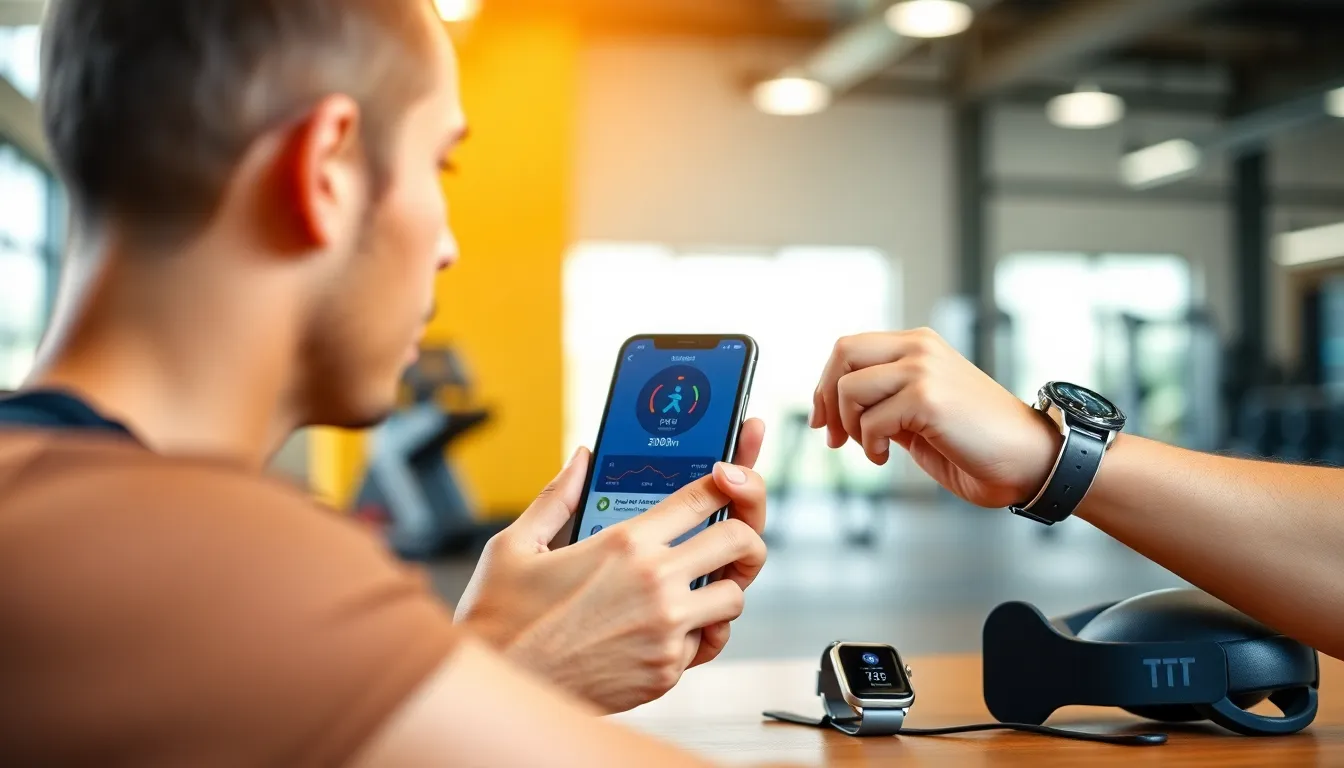In a world where binge-watching and couch-surfing reign supreme, activity tracking apps swoop in like superheroes for the fitness-challenged. These nifty little tools don’t just count steps; they transform everyday hustles into epic quests. Whether it’s conquering a 5K or simply remembering to stand up from the couch, these apps turn mundane tasks into thrilling adventures.
Table of Contents
ToggleOverview Of Activity Tracking Apps
Activity tracking apps offer more than basic functions like step counting. Users can monitor various metrics, including distance traveled, calories burned, and heart rates. These tools encourage healthier lifestyles by turning physical activity into engaging challenges. Completing a 5K or daily workouts motivates individuals to push their limits.
Features vary among apps in this market. Many include customizable goals, allowing users to set targets that fit their lifestyles. Gamification elements, such as badges or leaderboards, add a competitive dimension that enhances user experience. Compatibility with wearable devices extends functionality, providing real-time data and feedback for effective tracking.
Many apps also provide social connectivity. Friends and family can join users in challenges, creating a supportive community that fosters accountability. Sharing achievements on social media serves as an additional motivator for sustained engagement.
Privacy considerations remain paramount. Users must review app privacy policies to ensure their data remains secure, particularly for those sharing information with third parties. Customizable privacy settings within these apps offer some control over personal information.
The variety of options allows each individual to find an app suited to their specific needs. Popular apps feature different focuses, from running and cycling to yoga and strength training. Some apps even integrate nutrition tracking, providing a holistic approach to health and wellness.
By leveraging modern technology, activity tracking apps transform everyday movements into pathways for fitness and achievement. Users increasingly rely on these tools to enhance their daily routines, fostering a culture of health-consciousness in the modern world.
Features To Consider

Evaluating activity tracking apps involves examining specific features that enhance user experience. Key features to consider include user interface, compatibility, and customization options.
User Interface
An intuitive user interface improves accessibility. Clean layouts and simple navigation attract users, facilitating a seamless experience. Visual elements like graphs and charts present data clearly, making it easy to track progress. Well-designed apps often include features like quick access buttons for essential metrics, elevating user satisfaction. An engaging user interface encourages regular interaction, which leads to better tracking habits.
Compatibility
Compatibility is crucial for seamless integration with devices. Many activity tracking apps work with smartphones, smartwatches, and fitness bands. Cross-platform support enables users to access their data across various devices. Additionally, compatibility with third-party apps enhances functionality, allowing users to sync health data from multiple sources, including nutrition tracking apps. This interconnected experience supports a holistic approach to fitness management.
Customization Options
Customization options enable users to tailor their experience. Apps that allow setting personalized goals cater to individual lifestyles. Users benefit from features like adjustable metrics for tracking steps, distance, and calories burned. Gamification elements, such as challenges and rewards, motivate users to engage with the app consistently. The ability to customize notifications ensures users receive reminders that suit their preferences, enhancing overall effectiveness.
Popular Activity Tracking Apps
Numerous activity tracking apps empower users to enhance their fitness journeys effectively. Here are three standout options with unique features.
App 1: Overview and Features
MyFitnessPal offers robust tracking for physical activity and nutrition. Users can log meals, exercise routines, and weight loss progress in one comprehensive platform. The app features a vast food database, allowing users to easily track caloric intake. Customizable goals motivate users to stay on target. Social features let users connect with friends, fostering motivation through shared experiences.
App 2: Overview and Features
Strava excels in activity tracking for runners and cyclists. With GPS integration, it provides accurate distance and speed measurements. Strava’s community aspect encourages competition through challenges and leaderboards. Users can also analyze performance with detailed statistics on pace and heart rate. The app allows sharing achievements on social media, enhancing accountability and motivation.
App 3: Overview and Features
Fitbit app pairs seamlessly with various Fitbit devices to track health metrics. It monitors steps, workouts, and sleep patterns effectively. Users find an intuitive interface that enables easy data access and goal setting. The app supports personalized coaching and challenges, enhancing user engagement. Community features help users connect and share their fitness journeys, promoting a supportive environment.
Benefits Of Using Activity Tracking Apps
Activity tracking apps offer numerous benefits that support healthier lifestyles and personal well-being. Users experience enhancements in their physical activity, motivation, and overall health monitoring.
Health Monitoring
Users effectively monitor vital health metrics through these apps. Data like heart rate, calories burned, and distance traveled helps in assessing individual progress. Many apps allow users to set specific health goals, such as weight loss or improved cardiovascular fitness. By tracking these metrics, individuals get real-time insights into their physical activity. Over time, users can identify trends and make informed decisions about their fitness routines.
Motivation and Accountability
Gamification features motivate users to stay active. Badges, leaderboards, and progress tracking create a competitive atmosphere among friends and community members. Users often find that sharing goals with others fosters accountability. The encouragement from peers keeps individuals motivated and committed to their fitness journey. Turning fitness activities into fun challenges transforms mundane tasks into engaging experiences. Activity tracking apps empower users to push their limits and stay on course toward their fitness objectives.
Activity tracking apps are reshaping how individuals approach fitness and wellness. By turning mundane activities into engaging challenges they inspire users to adopt healthier lifestyles. With features like gamification social connectivity and personalized goals these apps not only enhance user experience but also foster a supportive community.
As technology continues to evolve these apps will likely become even more integral to personal health management. Users should remain mindful of privacy settings while exploring the diverse options available. Ultimately activity tracking apps empower individuals to take charge of their fitness journeys transforming everyday movements into meaningful achievements.



